| Content Column |
|---|
| tabbed-blocks | expanders |
|---|
| width | 100.00002% |
|---|
| id | 50765587 |
|---|
| | Content Block |
|---|
| not-tabbed | true |
|---|
| id | 1745269982 |
|---|
| Use these preferences to set interaction rules for when you are in Circulation, and choose what additional information you want to see. 
Click the tabs below to expand for more information. |
| Content Block |
|---|
| name | User Interaction |
|---|
| id | 50770081 |
|---|
| 
BehaviorYou can prevent unexpected check ins while in check out mode and ignore payment prompts when nobody is there to pay. - Check Out. Customize the behavior of the Check Out mode. This can be useful when your site uses separate Workstations—some that only allow bookdrop and others that only allow check out—although the Self-Service module is better for that. You have three options:
- Allow check in during check out. The default selection; this option allows items belonging to the current patron to be bookdropped when the Circulation window is in Check Out mode.
- Allow check in with confirmation during check out. If selected, the program will not allow an item (or items) belonging to the current patron to be bookdropped or renewed during Check Out mode without operator confirmation.
- Don't allow check in during check out. If selected, the program will not allow items belonging to the current patron to be bookdropped or renewed when the Circulation window is in Check Out mode. For example, if you attempt to bookdrop an item that a patron currently has checked out, or you mistakenly scan the item barcode twice during the original transaction, you will be informed that bookdrops aren't allowed during checkout.
- Hide overdue payment windows in Bookdrop mode. Normally when you are in Bookdrop (B) mode and return an overdue book, you'll get the chance to handle the fine in a payment window. Turn on this option to prevent that window from showing, and process the fines automatically—this is useful when patrons aren't present when you process bookdrops.
AlertsTurn these on to be alerted to specific situations while working in Circulation. - Alert for Copies from Different Sites. Set this dropdown to get special alerts when working with copies that don't belong to the site you are working at. (Centralized catalogs only.)
- Never
- During Check In and Inventory
- During Check In, Renewal, and Inventory
- Always
- Show patron alerts on overdue items. When checked, an alert message and sound will occur when a patron with overdue items is made current.
- Show patron alerts on in-stock holds. When checked, an alert message and sound will occur when a patron with available in-stock holds is made current.
- Show patron alerts for upcoming reservations. When checked, an alert message and sound will occur when a patron with upcoming reservations is made current.
| Tip |
|---|
If you would like an alarm sound to occur when a patron with charges (i.e. fines) is made current, configure your Patron > Check Out > Alert When Charges Exceed for each patron policy. |
DisplayDo you use reading programs and copy conditions? This information shows in the Current Item and Current Patron panes. - Display patron Lexile. This is part of the Expanded Lexile Services add-on. When checked, a patron's Lexile measurement is displayed—if provided in the patron Lexile tab. Read Patron Lexiles for more information.
- Display patron Reading Level. When checked, a patron's reading level is displayed (if provided in the patron Personal Info tab). These levels are added in Patrons Management > Programs tab. If you have privacy issues concerning a patron's reading level information being displayed on the Circulation window, leave this box unchecked.
- Display Item Reading Level. When checked, the copy’s reading level will be displayed, if available. The level used will be determined by your library's reading system.
- Display Copy Condition. When checked, the copy’s condition is displayed. Condition codes are created and maintained in Preferences > Codes > Condition Codes, and can be added to individual copies in Items Management.
- Display Textbook checkouts/charges in Patron Details. When checked, information on checkouts and charges from the Textbook Tracker add-on will show on the Patron Details window in Circulation.
- Preferred Study Program. This dropdown contains a list of Reading Study Programs your library uses. Choose what program you want to display on the Circulation screen. (Researcher programs are set in Builder.)
| Expand |
|---|
| title | Click to view the old interface |
|---|
| 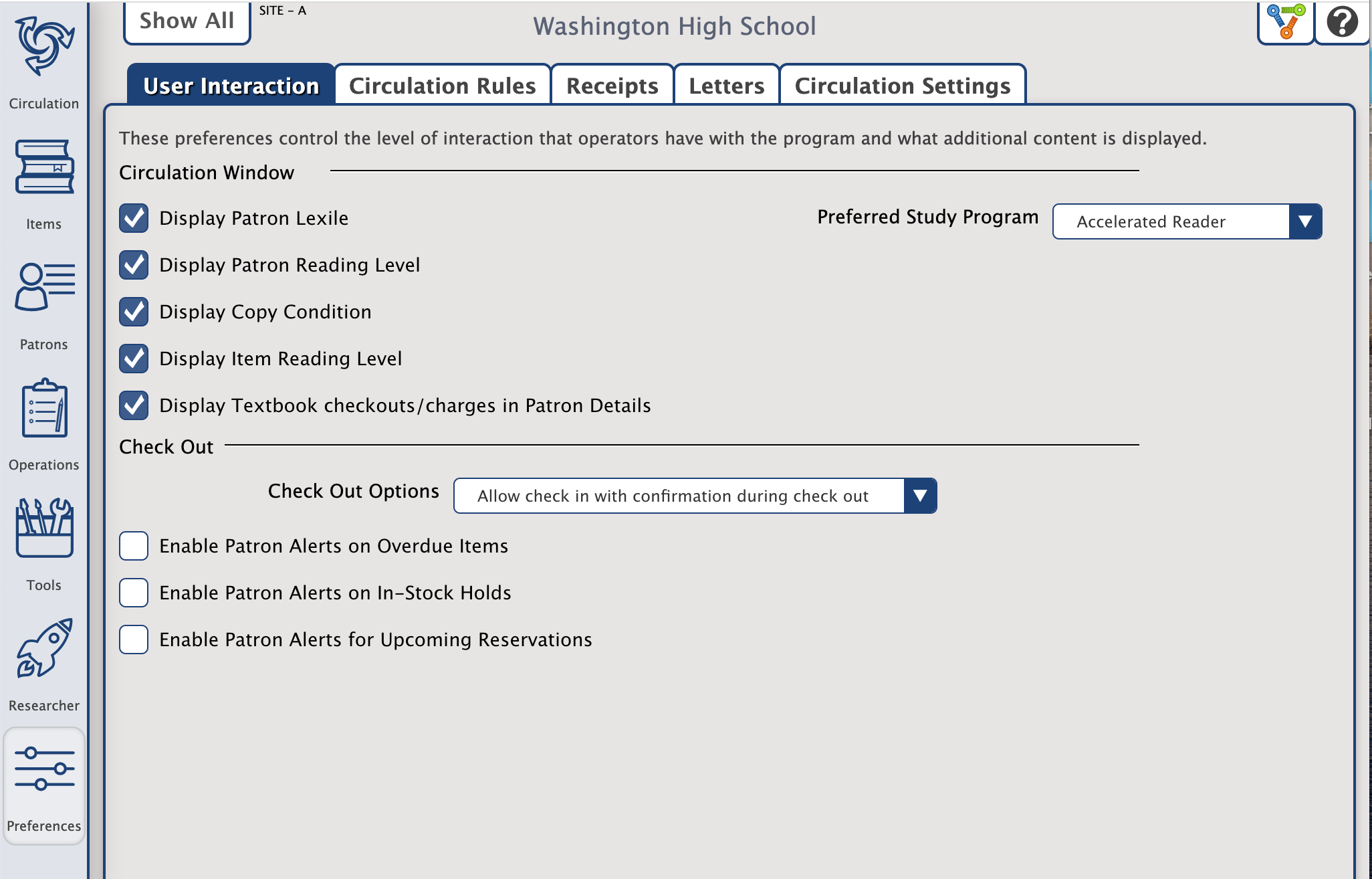
Circulation Window- Display Patron Lexile. This is part of the Expanded Lexile Services add-on. When checked, a patron's lexile measurement is displayed (if provided in the patron Lexile tab) in the Current Patron section of the Circulation window, Alexandria Researcher, etcetera.
- Display Patron Reading Level. When checked, a patron's reading level is displayed (if provided in the patron Personal Info tab) in the Current Patron section of the Circulation window, Alexandria Researcher, etcetera; for more information, please review the Reading Level field in the Personal Info tab of the Patrons Management window. If you have privacy issues concerning a patron's reading level information being displayed on the Circulation window, leave this box unchecked.
- Display Copy Condition. When checked, the copy’s condition is displayed in the Current Item pane of the Circulation window, Alexandria Researcher, etcetera; for more information, please review the copy Condition field in the Copy Info subtab of the Items Management window. Condition codes are created and maintained in the Condition Codes preferences window.
- Display Item Reading Level. When checked, the copy’s reading level will be displayed, if available. The level used will be determined by your Library's reading system.
- Display Textbook checkouts/charges in Patron Details. When checked, information on checkouts and charges from the Textbook Tracker Add-on will show on the Patron Details dialog in Circulation.
- Preferred Study Program. This drop down contains a list of Reading Study Programs your library currently uses.
Check Out OptionsThese settings are sometimes useful when your site has need of separate Workstations—some that only allow bookdrop and others that only allow check out. However, the Self-Service module serves these needs far better. The Check Out Options dropdown menu allows you to change the default functionality and customize the behavior of the Check Out mode. You have three options: - Allow check in during check out. The default selection; this option allows items belonging to the current patron to be bookdropped when the Circulation window is in Check Out mode.
- Allow check in with confirmation during check out. If selected, the program will not allow an item (or items) belonging to the current patron to be bookdropped or renewed during Check Out mode without operator confirmation.
- Don't allow check in during check out. If selected, the program will not allow items belonging to the current patron to be bookdropped or renewed when the Circulation window is in Check Out mode. For example, if you attempt to bookdrop an item that a patron currently has checked out, or you mistakenly scan the item barcode twice during the original transaction, you will be informed that boodrops aren't allowed during checkout.
Patron AlertsThese preferences configure patron alerts for overdue items, in-stock holds, and upcoming reservations; if you would like an alarm sound to occur when a patron with charges (i.e. fines) is made current, make sure the Alert When Fines Exceed setting in your Patron Check Out Policies is properly configured. - Enable Patron Alerts on Overdue Items. When checked, an alert message and sound will occur when a patron with overdue items is made current.
- Enable Patron Alerts on In-Stock Holds. When checked, an alert message and sound will occur when a patron with available in-stock holds is made current.
- Enable Patron Alerts for Upcoming Reservations. When checked, an alert message and sound will occur when a patron with upcoming reservations is made current.
|
|
| Content Block |
|---|
| not-tabbed | false |
|---|
| name | Circulation Rules |
|---|
| id | 50765586 |
|---|
| 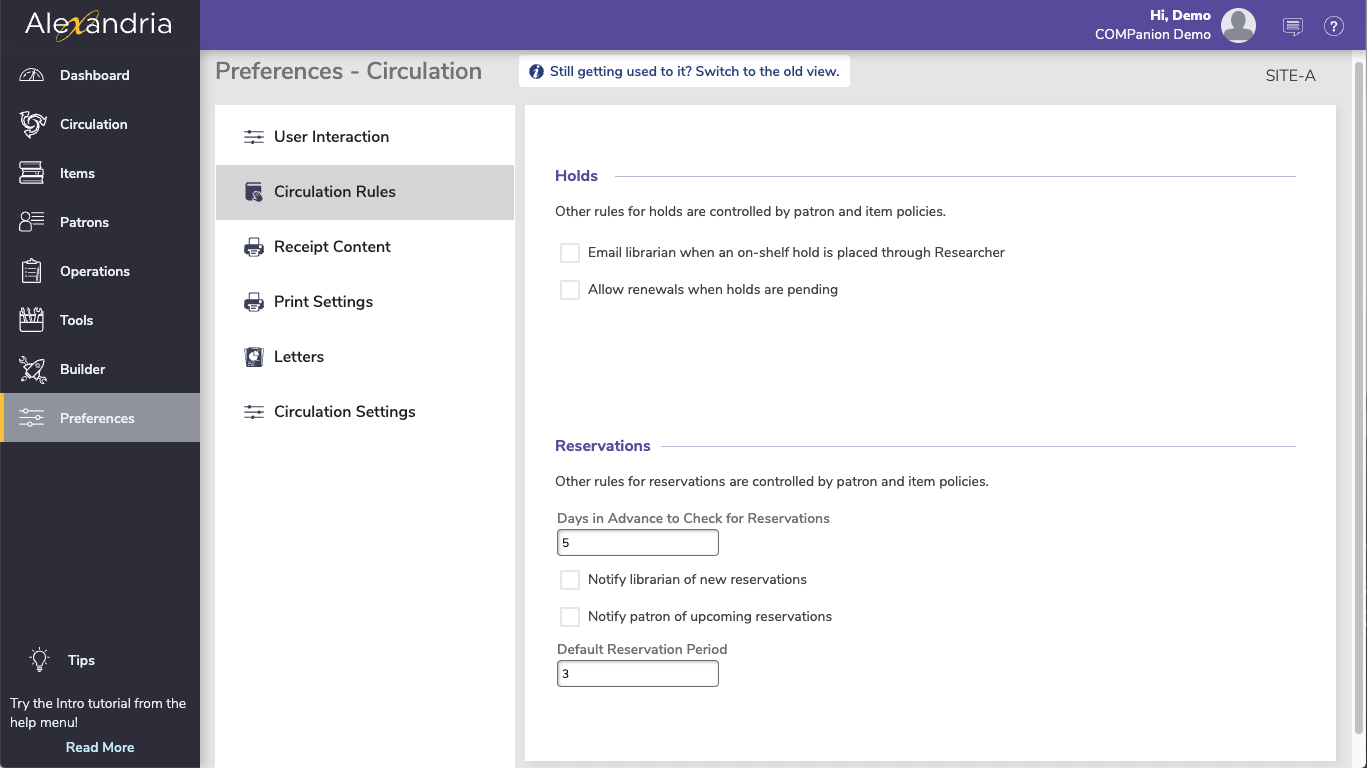
These preferences configure general circulation settings for holds and reservations. Note that other rules for holds and reservations are controlled by patron and item policies. Holds- Email librarian when an on-shelf hold is placed through Researcher. When checked, Alexandria will use the email specified in Sites Management to notify operators when an on-shelf hold is placed on an item from the Researcher. Notifications are not emailed to operators when an item status changes to On-Shelf as a result of a Bookdrop from the Circulation window; operators are typically aware when this happens.
- Allow renewals when holds are pending. When checked, patrons are allowed to renew items which have hold requests pending from other patrons. This is typically not something you want to allow, except in cases when patrons can not return items for prolonged periods (e.g. summer break, pandemic closures).
Reservations- Days in Advance to Check for Reservations. This setting allows you to enter the number of days prior to a reservation's requested start date needed to prepare an item for reservation. This way, items with reservations can (a) be available for general circulation X number of days before their scheduled reservation start date, and (b) fulfill their requesting patron's reservation. During check in, if an item reservation is detected within this adjacent “days ahead” time period, Alexandria will notify the current operator. The “GG” and “GPP” circulation commands also take this setting into account before allowing you to check out an item that has a reservation. Regardless of your policies, when an item with a reservation is checked out to the requesting patron, the item due date will always be the reservation end date. This is also the number of days that Alexandria looks ahead before emailing upcoming reservation notifications. The default is 5 days.
- Notify librarian of new reservations. When checked, Alexandria will email notifications to operators (specified in Sites Management) when a patron places a reservation on an item.
- Notify patron of upcoming reservations. When checked, Alexandria will email notifications to patrons about upcoming reservations, Where 'upcoming' are any reservations that fall in the 'days in advance' option.
- Default Reservation Period. Choose the default number of days selected in the Place Reservation window (in both Librarian and Researcher). The default is 3 days.
Default Reservation Period | Info |
|---|
Other rules for holds and reservations are controlled by Patron and Item policies. |
| Expand |
|---|
| title | Click to view the old interface |
|---|
| 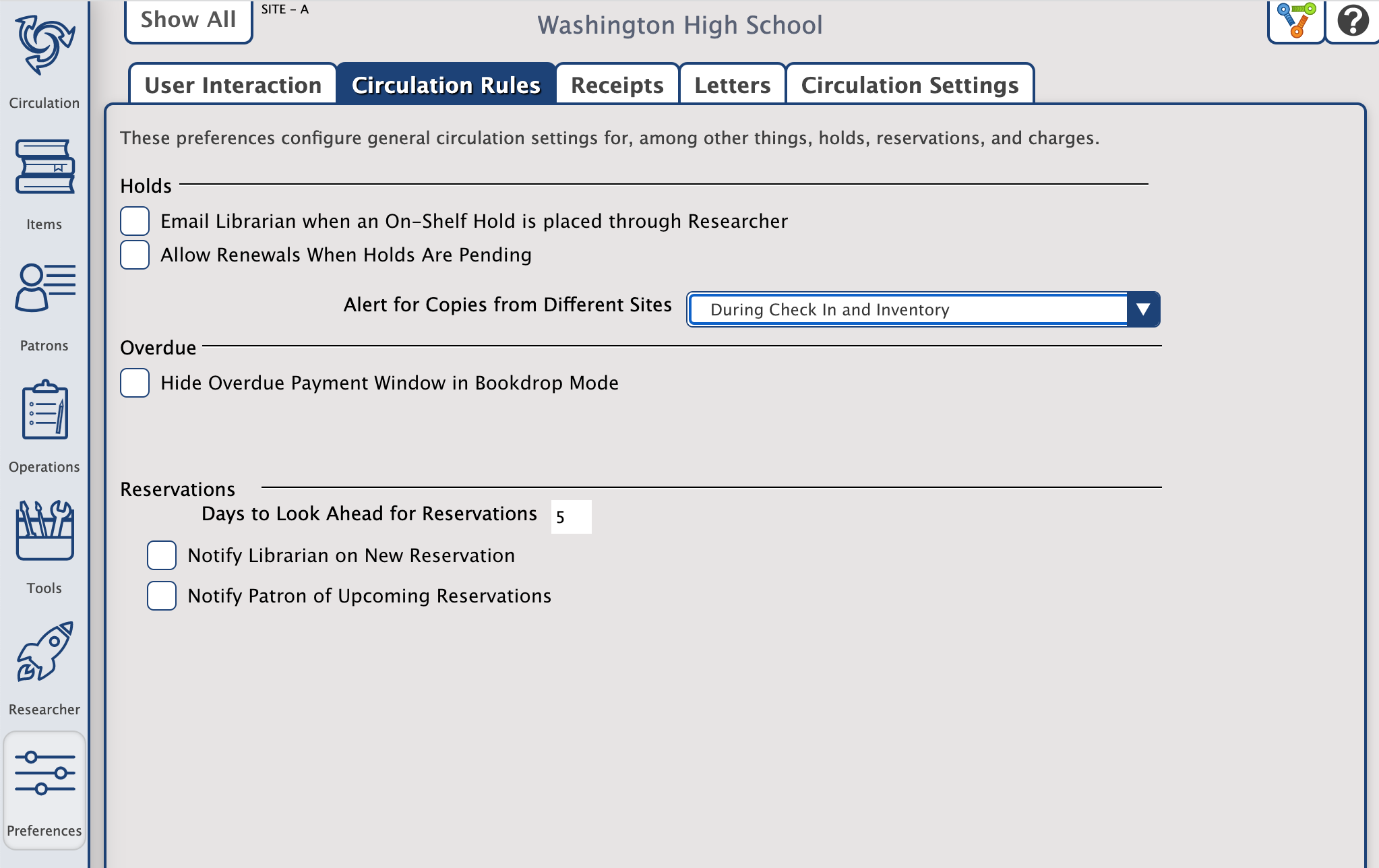
Holds Settings- Email Librarian on On-Shelf Hold. When checked, Alexandria will use the Email address(es) specified in the Sites Management window to notify operators when a Hold (placed on an item from the Researcher) is changed to an On-Shelf Hold. Notifications are not emailed to operators when an item status changes to On-Shelf as a result of a Bookdrop from the Circulation window; operators are typically aware when this happens.
- Allow Renewals When Holds Are Pending. When checked, patrons are allowed to renew items which have hold requests pending from other patrons.
Centralized Catalog- Alert for Copies from Different Sites. Set this dropdown to get special alerts when working with copies that don't belong to the site you are working at.
Overdue Settings- Hide Overdue Payment Window in Bookdrop Mode. When checked, if the Circulation window is in Bookdrop (B) mode, a patron is automatically fined (without requiring operator interaction) when an overdue book is returned.
Reservations Settings- Days to Look Ahead for Reservations. This setting allows you to enter the number of days prior to a reservation's requested start date needed to prepare an item for reservation. This way, items with reservations can (a) be available for general circulation X number of days before their scheduled reservation start date, and (b) fulfill their requesting patron's reservation. During check in, if an item reservation is detected within this adjacent “days ahead” time period, Alexandria will notify the current operator. The “GG” and “GPP” circulation commands also take this setting into account before allowing you to check out an item that has a reservation. Regardless of your policies, when an item with a reservation is checked out to the requesting patron, the item due date will always be the reservation end date. This is also the number of days that Alexandria looks ahead before emailing upcoming reservation notifications. The default is 5 days.
- Notify Librarian on New Reservation. When checked, Alexandria will email notifications to operator(s) (specified in the Sites Management window) when a patron places a reservation on an item.
- Notify Patron of Upcoming Reservations. When checked, Alexandria will email notifications to patrons about upcoming reservations.
|
|
| Content Block |
|---|
| name | Receipt Content |
|---|
| id | 1740554303 |
|---|
| If you print receipts for patrons at your site, these preferences allow you to customize the information printed on your receipts; this information applies whether you print a paper (8½" x 11") receipt from local or network printer or a 3" receipt from COMPanion's Network Receipt Printer. The settings that configure when receipts are printed can be located in Print Settings. Receipt printing is best done with COMPanion's Network Receipt Printer; it provides a convenient and economical means of printing receipts for common circulation transactions such as check outs, placed holds, fines, fees, payments, and refunds. | Info |
|---|
This is an optional feature of Alexandria; you must be purchase and register a Slip Printer license in order for this preference to be available. If you're interested in licensing use of COMPanion's receipt printer component, contact your sales representative at (800) 347-6439 and ask about part V7001. |
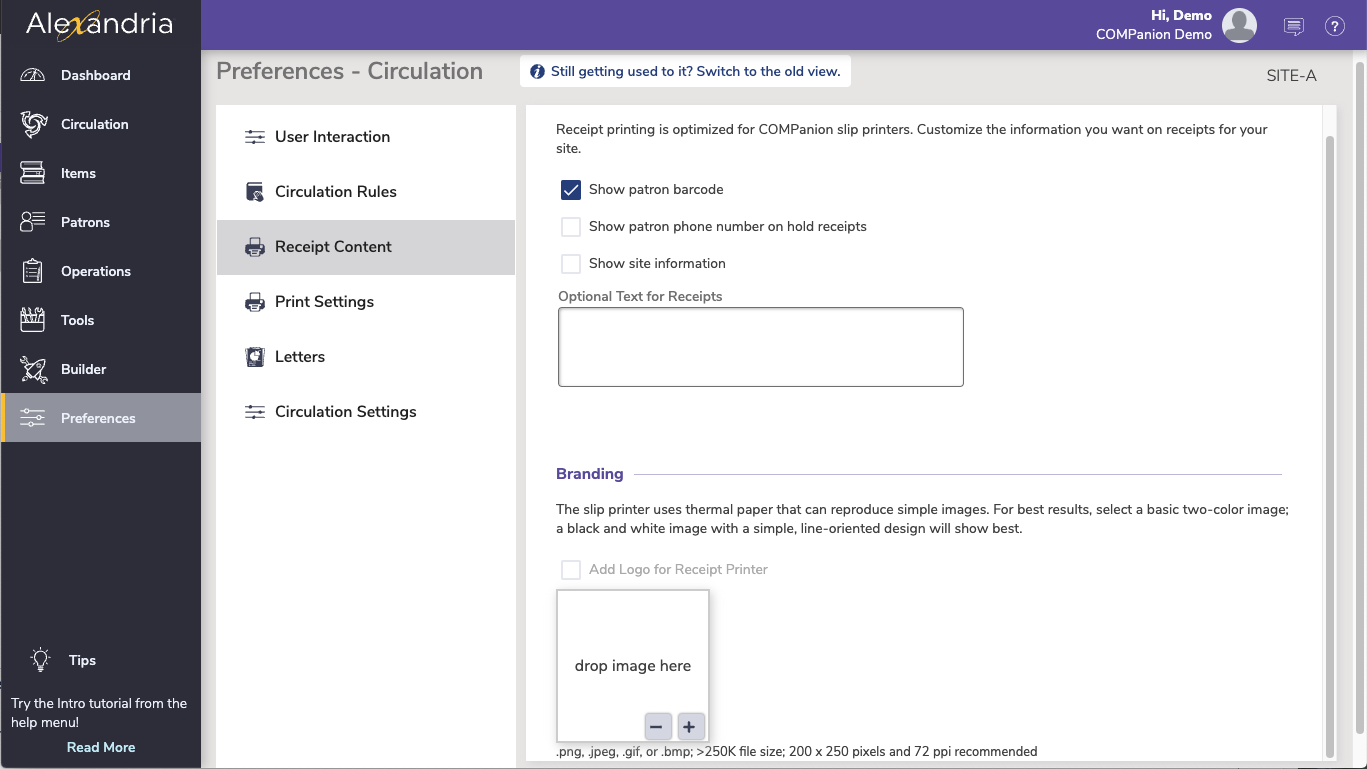
- Show patron barcode. If you uncheck this, check in/out receipts won't show the patron’s barcode.
- Show patron phone number on hold receipts. Check this option to show the patron's phone number on printed in-stock hold slips. You can print these slips using the dialog box that appears when a currently checked out item with an in-stock hold is bookdropped or by using the Holds subtab in the Circulation window. The item with the in-stock hold can then be set aside—slip attached—and the requesting patron contacted (via telephone) at your leisure.
- Show site information. When checked, your site's name, address and contact information is included on all receipt type.
- Optional Text for Receipts. If you would like to, add text that will appear on receipts.
Branding- Add Logo for Receipt Printer. Add a logo that will appear on receipts. The slip printer uses thermal paper that can reproduce simple images clearly. For best results, please select a very basic bi-color image for display on receipts; a black and white image with a simple, line-oriented design is preferred. The logo must be an image format (e.g. JPEG, GIF, PNG, or BMP) supported by your browser and by the Network Receipt Printer. For optimal quality, the image should have a dimension no larger than 200 pixels wide by 250 pixels high and 72 ppi.
|
| Content Block |
|---|
| name | Print Settings |
|---|
| id | 1744708093 |
|---|
| These preferences activate the COMPanion Network Receipt Printer, which provide convenient and economical means of printing receipts for common circulation transactions such as check outs, placed holds, fines, fees, payments, and refunds. | Warning |
|---|
These settings are specific per browser and stored through cookies. If you clear your browser cache, do not clear cookies. Otherwise, these settings will also be cleared. |
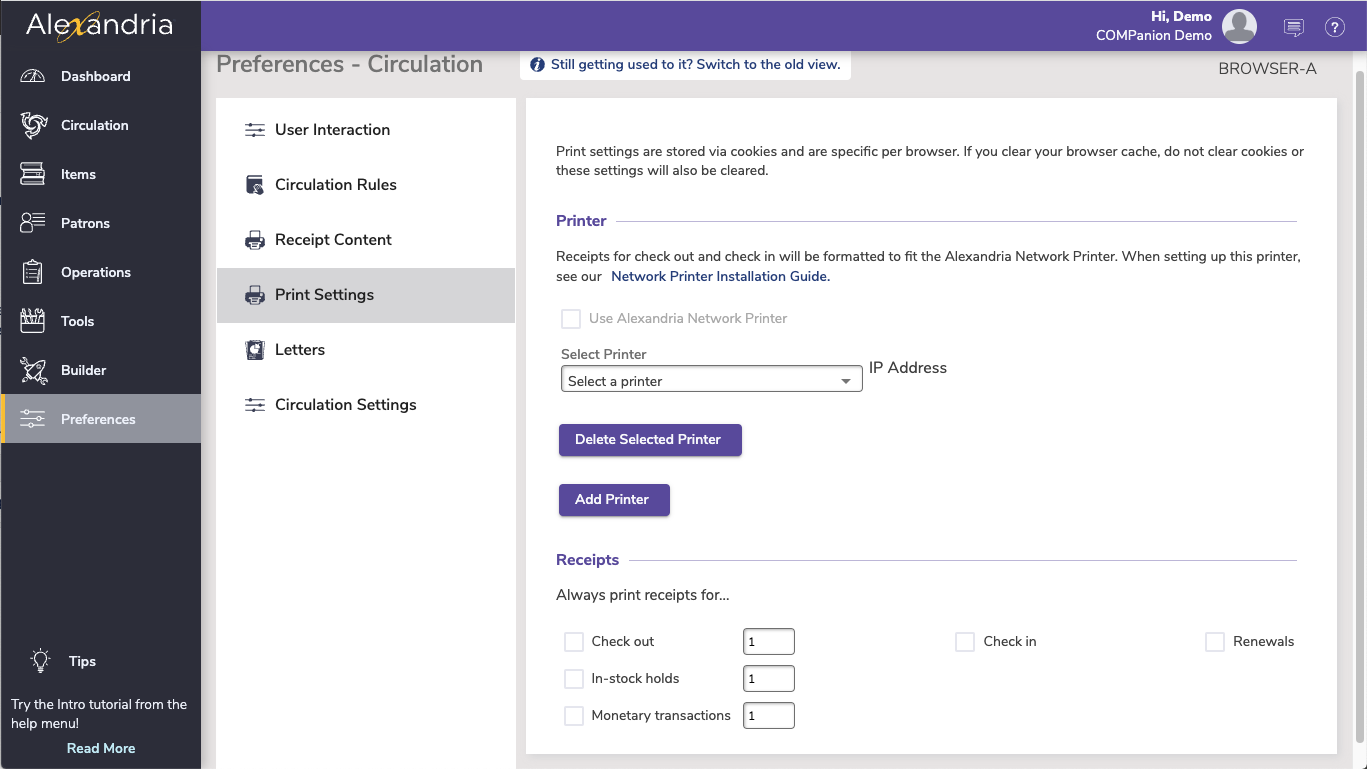
PrinterWhen setting up this printer, see our Network Printer Installation Guide. - Use Alexandria Network Printer. Receipts for Check Outs, Check Ins, In-Stock Holds, etc., will be formatted to fit this receipt printer.
- Select Printer. Specify the IP address of the receipt printer.
| Note |
|---|
You can add multiple printers and select one that has already been added. |
ReceiptsChoose to always print receipts for the following types of receipts. For some receipts, you can also specify the number of receipts that will print (e.g. some people like 2 copies of in-stock hold receipts, one to put inside the book, and one for other processing). When you don't print receipts automatically, you can still print the receipts manually using the “D” or “QP” command in the Circulation window at the end of a transaction. - Check out. Prints when an item is checked out. This is for each individual item; to print a summary receipt, use the “D” or “QP” commands.
- Check in. Prints when an item is bookdropped.
- Renewals. Prints when an item is renewed.
- In-stock holds. Prints when an item is bookdropped and becomes an in-stock hold. Usually this is put with the item that goes in the in-stock hold area of your library. You can also print these from the Holds tab.
- Monetary transactions. Prints for monetary transactions such as refunds and payments. You can also print these from the Charges > Payments subtab.
|
| Content Block |
|---|
| Customize and standardize the notices sent from your library. Once notice reports are set up, you will have the option to modify the text on the individual notice. 
Reset to go back to the default text. Insert Variable to insert various variables which will be filled when the notice is generated. These preferences are used to customize and manage the messages that appear in the patron notices sent from your library. Select a letter from the left, and then view and edit it on the right. | Info |
|---|
Each letter has a character limit of 1500 (with the exception of the Circulation Notice Email Subject, which has a 100 character limit). |
TemplatesAccount Access Information notice is used to provide patrons with account access information. It is also included when new account information is initially emailed. The default text reads: Here is your barcode ID and Username for accessing the library catalog. This information is necessary for accessing your patron status details which includes a list of items you have checked out and their due dates, holds and reservations you have placed and their expiration dates, and any charges you owe the library. You will need this information to place holds or reservations if you are allowed to do so. You may change your username and password using the Alexandria Researcher application or using the Alexandria Web Catalog.
This letter is not shared with Textbook Tracker. Circulation Letter allows you to customize the default body text of Circulation Letters. The message is also included in circulation letters dispatched during Daily Operations. The default text reads: The following items require your attention. Please contact the library as soon as possible.
Circulation Notice allows you to customize the default body text of Circulation Notices. The default text reads: The following items require your attention. Please contact the library as soon as possible.
Circulation Notice Email Subject allows you to customize the default body text of Circulation Notice Email Subject notices (character limit of 100). The default text reads: Notice from your Library.
Damage Letter allows you to customize the default body text of Damage Letter notices. The default text reads: The following items have been damaged and appropriate fines charged.
Email Signature notice is where you can set your email signature. Usually, this is the name, address, and phone number of the school library or institution. It is also included on patron notifications dispatched during Alexandria's Daily Operations. The default uses the variable tags. You can also customize your message with variable tags listed at the bottom of this section. %SITEADMIN% %SITEADDRESS%
In-Stock Hold allows you to customize the default text of in-stock hold notices. The default text reads:
An In-Stock item is being held for you. Please pick it up by the specified date or it will be returned to general circulation.
Overdue Suspension Notice is dispatched when the Days Suspended per Overdue Day Policies preference has been triggered. The default text reads: Your library privileges have been suspended because the following item has been overdue.
Patron Suspension Notice is used to inform a patron that their account is suspended. The default text reads: The library has suspended this account. Until the suspension is cleared, items cannot be checked out and holds and reservations cannot be placed. If you have any questions, please contact your library.
Refund Letter allows you to customize the default body text of Refund Letter notices. The default text reads: You have been issued a refund with the following information.
Reservation Notice allows you to customize the default body text of Reservation notices. The default text reads: Please note that you have a reservation on the following items. Reserved items should be picked up in the morning of the reservation start date and returned by the evening of the due date.
Subscription Claim Letter allows you to customize the default body text of Subscription Claim letter. The default text reads: Our library has yet to receive one or more issues of the indicated periodicals. Approximate dates for the missing issues are listed below. Please send us the missing issues in a timely manner.
Use these variable tags in your letter templates to add standard or personalized data to your emails. For example, you can add %PATRON% to the top of each letter template to personalize it with the recipient's first and last name, as listed on their patron record.
| Variable Tag | Data the Tag Displays |
|---|
| %PATRON% | Patron's name: Firstname Lastname | | %PATRONBARCODE% | Patron's barcode: 123456789 | | %SITEADDRESS% | The library's site address listed in Site Preferences, formatted with line breaks: Site Name
Address 1
Address 2
City, State Zip
Country | %SITEADMIN% | Site Contact's title, first name, and last name, as listed in Site Preferences: Title: Firstname Lastname | | %USERNAME% | Patron's username: jsmith |
|
| Content Block |
|---|
| name | Circulation Settings |
|---|
| id | 50779150 |
|---|
| These preference contain some general circulation settings. For those in a Centralized Catalog environment, the Interlibrary Loans settings configure the default time periods (in days) allowed for items “in transit” or “in-stock” before showing up in the In Transit to Current Site, Late in Arriving report. - Enable automatic email notifications. Check this box if you want to email confirmations and notices automatically sent to patrons with valid email addresses when the following events occur: a hold is placed, a hold expires, an in-stock hold is available, an in-stock hold expires, item becomes overdue, a reservation is placed, or a reservation is removed. To make this option available and to guarantee that your email notifications are being sent, you must have a valid Library Email Address (Sites Management), a valid patron email address (Patron Management), text in your Letters Preferences, and this Enable Automatic Email Notifications box checked.
Interlibrary Loans- In Transit Features On/Off. When the toggle is on, In-Transit features are disabled (e.g. circulation commands “CH”, “IT”, “NT”, “NTD”, and System Patron 9); the only In-Transit related operation that can be performed is Bookdrop.
- Average In Transit Period. Specify the average number of days that it takes for items to be delivered from one site to another. Once this time period has elapsed, if the item has not been received at the expecting library, it will appear in the In Transit to Current Site, Late in Arriving report. Default is 7.
- In-Stock Hold Period. For items delivered to a site via the In Transit system patron; this preference sets the number of days that an item (or items) are placed on an In-Stock Hold after delivery. This preference overrides the Days to Keep an In-Stock Hold Request patron policy, however, it does not apply to items placed on In-Stock Hold for regular (i.e. non-system) patrons. Default is 7.
| Expand |
|---|
| title | Click to view the old interface |
|---|
| Receipt Settings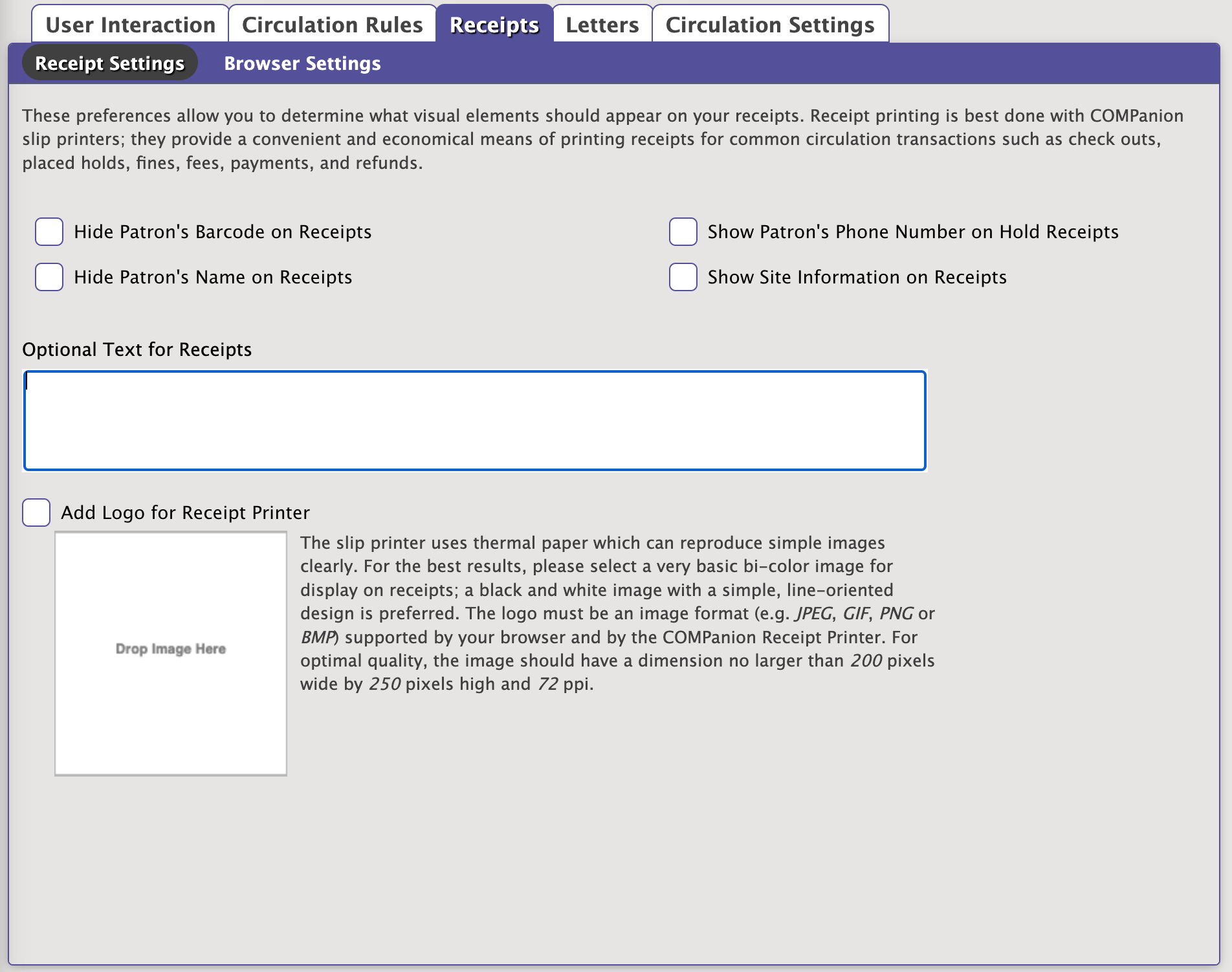
- Hide Patron’s Barcode on Receipts. Obscures a patron’s barcode with asterisks (e.g. “ * ” ) for check in/out receipts.
- Hide Patron’s Name on Receipts. When checked, receipts will print a patron’s initials instead of their full name.
- Show Patron Phone Number on Hold Slips. When checked, a patron's phone number will be included on printed stock hold slips. You can print these slips using the dialog box that appears when a currently checked out item with an in-stock hold is bookdropped or by using the Holds subtab in the Circulation window. The item with the in-stock hold can then be set aside—slip attached—and the requesting patron contacted (via telephone) at your leisure.
- Show Site Information on Receipts. When checked, your site's name, address and contact information is included on all receipt type.
- Optional Text for Receipts. If you would like to, add text that will appear on receipts.
- Add Logo for Receipt Printer. Add a logo that will appear on receipts. The slip printer uses thermal paper that can reproduce simple images clearly. For best results, please select a very basic bi-color image for display on receipts; a black and white image with a simple, line-oriented design is preferred. The logo must be an image format (e.g. JPEG, GIF, PNG, or BMP) supported by your browser and by the Network Receipt Printer. For optimal quality, the image should have a dimension no larger than 200 pixels wide by 250 pixels high and 72 ppi.
Browser Settings These preferences activate the COMPanion Network Receipt Printer, which provide convenient and economical means of printing receipts for common circulation transactions such as check outs, placed holds, fines, fees, payments, and refunds. | Warning |
|---|
These settings are specific per browser and stored through cookies. If you clear your browser cache, do not clear cookies. Otherwise, these settings will also be cleared. |
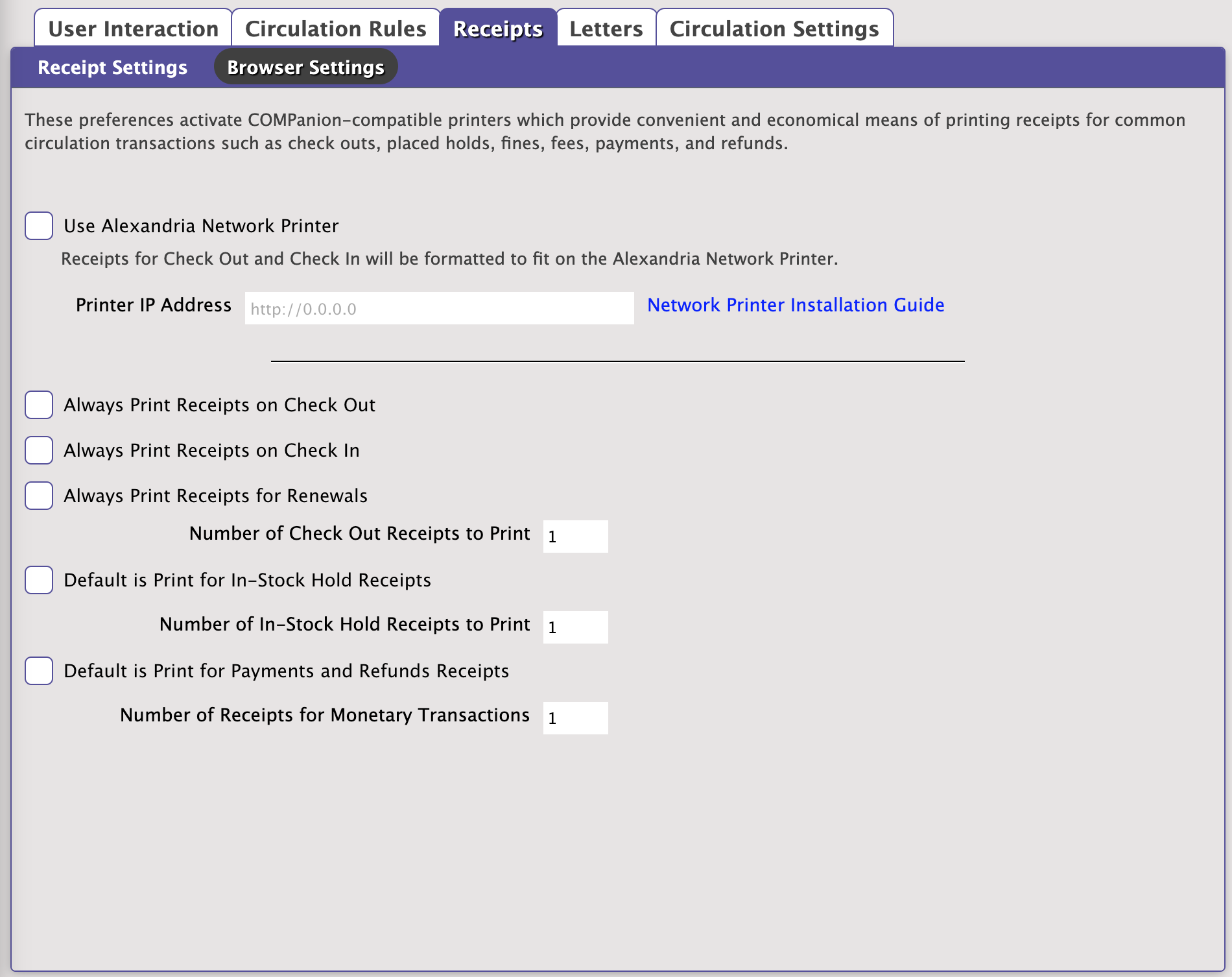
- Use Alexandria Network Printer. Receipts for Check Outs, Check Ins, In-Stock Holds, etc., will be formatted to fit this receipt printer.
- Printer IP Address. Specify the IP address of the receipt printer.
- Always Print Receipts on Check Out. When checked, Alexandria will automatically print a receipt for every item that is checked out. This receipt contains information similar to that which is displayed when you click on the current item’s Details button. When not checked, receipts can be printed manually using the “D” or “QP” command in the Circulation window at the end of a transaction.
- Always Print Receipts on Check In. When checked, Alexandria will automatically print a receipt for every item that is checked in. This receipt contains information similar to that which is displayed when you click on the current item’s Details button. When not checked, receipts can be printed manually using the “D” command in the Circulation window at the end of a transaction.
- Always Print Receipts for Renewals. When checked, Alexandria will automatically print a receipt for every item that is renewed. This receipt contains information similar to that which is displayed when you click on the current item’s Details button. When not checked, receipts can be printed manually using the “D” command in the Circulation window at the end of a transaction.
- Number of Check Out Receipts to Print. This indicates the number of receipts that will be automatically printed on check out, check in, or renewal.
- Default is Print for In-Stock Hold Receipts. When checked, Alexandria will automatically print a receipt when an item becomes an in-stock hold.
- Number of In-Stock Hold Receipts to Print. This indicates the number of in-stock hold receipts that are automatically printed when an in-stock hold request is made.
- Default is Print for Payments and Refunds Receipts. When checked, Alexandria will automatically print receipts for payments and refunds.
- Number of Receipts for Monetary Transactions. This indicates the number of receipts that will be automatically printed for monetary transactions such as refunds and payments.
|
|
|
|